Psyllium-based Supplement Market
Psyllium-based Supplement Market Size and Share Forecast Outlook 2025 to 2035
Psyllium-based supplement market is projected to grow from USD 1.2 billion in 2025 to USD 2.2 billion by 2035, at a CAGR of 6.2%. Powder will dominate with a 60.0% market share, while digestive health will lead the application segment with a 50.0% share.
Psyllium-based Supplement Market Forecast and Outlook 2025 to 2035
The global psyllium-based supplement market is projected to grow from USD 1,200.0 million in 2025 to approximately USD 2,200.0 million by 2035, recording an absolute increase of USD 1,000.0 million over the forecast period. This translates into a total growth of 83.3%, with the market forecast to expand at a compound annual growth rate (CAGR) of 6.2% between 2025 and 2035.
The overall market size is expected to grow by nearly 1.8X during the same period, supported by increasing demand for natural digestive health solutions, rising adoption in weight management applications, and increasing focus on advanced fiber technologies across the global nutraceutical and wellness sectors.
Quick Stats for Psyllium-based Supplement Market
- Psyllium-based Supplement Market Value (2025): USD 1,200.0 million
- Psyllium-based Supplement Market Forecast Value (2035): USD 2,200.0 million
- Psyllium-based Supplement Market Forecast CAGR: 6.2%
- Leading Form in Psyllium-based Supplement Market: Powder (60.0%)
- Key Growth Regions in Psyllium-based Supplement Market: Asia Pacific, North America, and Europe
- Key Players in Psyllium-based Supplement Market: Dabur, Patanjali, NOW Foods, Nature's Bounty, Metamucil, Yerba Prima, Himalaya, Organic India
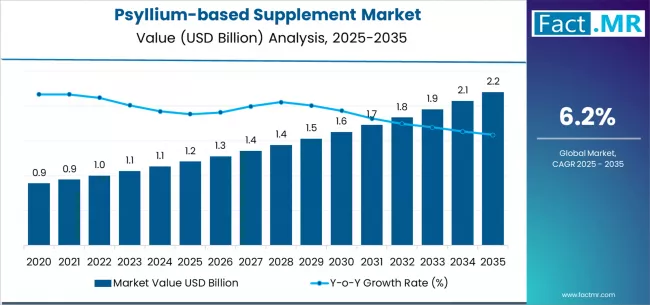
Between 2025 and 2030, the psyllium-based supplement market is projected to expand from USD 1,200.0 million to USD 1,650.0 million, resulting in a value increase of USD 450.0 million, which represents 45.0% of the total forecast growth for the decade.
This phase of development will be shaped by rising demand for natural fiber solutions, increasing applications in digestive health optimization, and growing penetration in emerging wellness markets.
Health product manufacturers are expanding their psyllium-based supplement capabilities to address the growing demand for advanced fiber systems in various nutraceutical applications and wellness operations.
Psyllium-based Supplement Market Key Takeaways
| Metric | Value |
|---|---|
| Estimated Value in (2025E) | USD 1,200.0 million |
| Forecast Value in (2035F) | USD 2,200.0 million |
| Forecast CAGR (2025 to 2035) | 6.2% |
From 2030 to 2035, the market is forecast to grow from USD 1,650.0 million to USD 2,200.0 million, adding another USD 550.0 million, which constitutes 55.0% of the overall ten-year expansion. This period is expected to be characterized by the expansion of advanced nutraceutical facilities, the integration of cutting-edge fiber technologies, and the development of customized supplement systems for specific health applications. The growing adoption of premium wellness standards and health requirements will drive demand for ultra-high quality psyllium-based supplement systems with enhanced performance specifications and consistent fiber characteristics.
Between 2020 and 2025, the psyllium-based supplement market experienced steady expansion, driven by increasing recognition of natural fiber technologies' importance in digestive health operations and growing acceptance of advanced wellness solutions in complex health management applications. The market developed as health product manufacturers recognized the need for high-efficiency fiber systems to address digestive requirements and improve overall wellness outcomes. Research and development activities have begun to emphasize the importance of advanced psyllium-based supplement technologies in achieving better efficiency and quality in health management processes.
Why is the Psyllium-based Supplement Market Growing?
Market expansion is being supported by the increasing demand for natural digestive health solutions and the corresponding need for high-efficiency fiber systems in psyllium-based supplement applications across global wellness and nutraceutical operations. Modern health product manufacturers are increasingly focused on advanced psyllium-based supplement technologies that can improve digestive performance, reduce health management costs, and enhance wellness outcomes while meeting stringent safety requirements. The proven efficacy of psyllium-based supplement products in various health applications makes them an essential component of comprehensive wellness strategies and digestive health programs.
The growing emphasis on health industry transformation and advanced wellness optimization is driving demand for ultra-efficient psyllium-based supplement systems that meet stringent performance specifications and safety requirements for health applications. Health product manufacturers' preference for reliable, high-performance fiber systems that can ensure consistent wellness outcomes is creating opportunities for innovative psyllium-based supplement technologies and customized formulation solutions. The rising influence of health guidelines and wellness protocols is also contributing to increased adoption of premium-grade psyllium-based supplement systems across different health applications and wellness systems requiring advanced fiber technology.
Opportunity Pathways - Psyllium-based Supplement Market
The psyllium-based supplement market represents a specialized growth opportunity, expanding from USD 1,200.0 million in 2025 to USD 2,200.0 million by 2035 at a 6.2% CAGR. As health product manufacturers prioritize digestive health, regulatory compliance, and wellness performance in complex health operations, psyllium-based supplement systems have evolved from a niche fiber product to an essential component enabling health management, wellness optimization, and multi-stage health production across nutraceutical operations and specialized wellness applications.
The convergence of health industry expansion, increasing fiber adoption, specialized wellness organization growth, and health requirements creates momentum in demand. High-efficiency formulations offering superior digestive performance, cost-effective powder variants balancing performance with economics, and specialized capsule variants for critical applications will capture market premiums, while geographic expansion into high-growth Asian health markets and emerging market penetration will drive volume leadership. Health industry emphasis on product quality and fiber reliability provides structural support.
- Pathway A - Powder Form Dominance: Leading with 60.0% market share, powder applications drive primary demand through complex health workflows requiring comprehensive fiber systems for digestive development. Advanced formulations enabling improved digestive performance, reduced health complications, and enhanced wellness outcomes command premium pricing from health manufacturers requiring stringent performance specifications and regulatory compliance. Expected revenue pool: USD 720.0-1,320.0 million.
- Pathway B - Digestive Health Application Leadership: Dominating with 50.0% market share through an optimal balance of performance and effectiveness, digestive health applications serve most wellness operations while meeting fiber requirements. This application addresses both performance standards and health considerations, making it the preferred choice for health and wellness operations seeking reliable digestive performance. Opportunity: USD 600.0-1,100.0 million.
- Pathway C - Asian Market Acceleration: India (8.5% CAGR) and China (7.2% CAGR) lead global growth through health infrastructure expansion, wellness capability development, and domestic psyllium-based supplement demand. Strategic partnerships with local health producers, regulatory compliance expertise, and supply chain localization enable the expansion of fiber technology in major wellness hubs. Geographic expansion upside: USD 250.0-450.0 million.
- Pathway D - E-commerce Premium Segment: E-commerce distribution serves specialized applications requiring exceptional accessibility for critical health processes. E-commerce formulations supporting direct-to-consumer requirements, complex wellness applications, and convenience-sensitive processes command significant premiums from advanced health organizations and specialized wellness facilities. Revenue potential: USD 480.0-880.0 million.
- Pathway E - Advanced Processing & Technology Systems: Companies investing in sophisticated psyllium-based supplement technologies, fiber processing systems, and automated wellness processes gain competitive advantages through consistent system performance and product quality reliability. Advanced capabilities enabling customized specifications and rapid deployment capture premium health partnerships. Technology premium: USD 180.0-320.0 million.
- Pathway F - Supply Chain Optimization & Reliability: Specialized distribution networks, strategic inventory management, and reliable supply chain systems create competitive differentiation in health markets requiring consistent psyllium-based supplement availability. Companies offering guaranteed supply security, technical support, and health documentation gain preferred supplier status with compliance-focused health manufacturers. Supply chain value: USD 150.0-280.0 million.
- Pathway G - Emerging Applications & Market Development: Beyond traditional digestive health applications, psyllium-based supplements in weight management, cholesterol support, and specialized delivery systems represent growth opportunities. Companies developing new applications, supporting R&D initiatives, and expanding into adjacent health markets capture incremental demand while diversifying revenue streams. Emerging opportunity: USD 120.0-220.0 million.
Segmental Analysis
The market is segmented by form, application, distribution channel, and region. By form, the market is divided into powder, capsules, and others. Based on application, the market is categorized into digestive health, weight management, and cholesterol support. By distribution channel, the market is divided into e-commerce, pharmacies, and retail. Regionally, the market is divided into Asia Pacific, North America, Europe, Latin America, Middle East & Africa.
By Form, Powder Segment Accounts for 60.0% Market Share
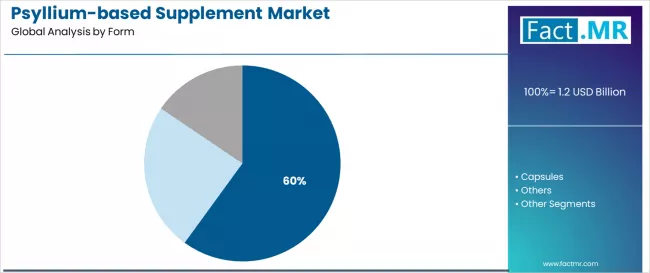
The powder segment is projected to account for 60.0% of the psyllium-based supplement market in 2025, reaffirming its position as the category's dominant form. Health product manufacturers increasingly recognize the optimal balance of performance and cost-effectiveness offered by powder formulations for most health applications, particularly in digestive wellness and health management operations. This form addresses both performance requirements and economic considerations while providing reliable fiber delivery across diverse health applications.
This form represents the foundation of most health protocols for fiber applications, as it represents the most widely accepted and commercially viable level of psyllium-based supplement technology in the industry. Quality control standards and extensive health testing continue to strengthen confidence in powder formulations among health and wellness providers. With increasing recognition of the cost-performance optimization requirements in health management, powder systems align with both operational efficiency and wellness goals, making them the central growth driver of comprehensive health strategies.
By Application, Digestive Health Segment Accounts for 50.0% Market Share
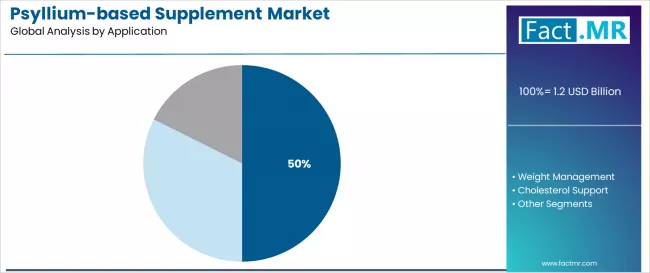
Digestive health applications are projected to represent 50.0% of psyllium-based supplement demand in 2025, underscoring their role as the primary application segment driving market adoption and growth. Health product manufacturers recognize that digestive health requirements, including complex wellness processes, specialized fiber needs, and multi-stage health systems, often require advanced psyllium-based supplement products that standard fiber technologies cannot adequately provide. Psyllium-based supplements offer enhanced digestive performance and health compliance in wellness applications.
The segment is supported by the growing nature of digestive health adoption, requiring sophisticated fiber systems, and the increasing recognition that advanced psyllium-based supplement technologies can improve health performance and wellness outcomes. Additionally, health manufacturers are increasingly adopting evidence-based health guidelines that recommend specific psyllium-based supplement products for optimal wellness outcomes. As understanding of health complexity advances and wellness requirements become more stringent, psyllium-based supplements will continue to play a crucial role in comprehensive health strategies within the digestive wellness market.
What are the Drivers, Restraints, and Key Trends of the Psyllium-based Supplement Market?
The psyllium-based supplement market is advancing steadily due to increasing recognition of natural fiber technologies' importance and growing demand for high-efficiency wellness systems across the health and nutraceutical sectors. However, the market faces challenges, including complex formulation processes, potential for quality variations during processing and storage, and concerns about supply chain consistency for specialized fiber products. Innovation in psyllium-based supplement technologies and customized health protocols continues to influence product development and market expansion patterns.
Expansion of Advanced Nutraceutical Facilities and Psyllium-based Supplement Technologies
The growing adoption of advanced nutraceutical facilities is enabling the development of more sophisticated psyllium-based supplement production and quality control systems that can meet stringent health safety requirements. Specialized health facilities offer comprehensive psyllium-based supplement services, including advanced processing and fiber delivery processes that are particularly important for achieving high-efficiency requirements in wellness applications. Advanced distribution channels provide access to premium products that can optimize health performance and reduce wellness costs while maintaining cost-effectiveness for large-scale health operations.
Integration of Digital Health Systems and Wellness Management Systems
Modern health organizations are incorporating digital technologies such as real-time quality monitoring, automated processing systems, and supply chain integration to enhance psyllium-based supplement handling and distribution processes. These technologies improve product performance, enable continuous quality monitoring, and provide better coordination between suppliers and consumers throughout the health cycle. Advanced digital platforms also enable customized performance specifications and early identification of potential quality deviations or supply disruptions, supporting reliable fiber product delivery.
Analysis of the Psyllium-based Supplement Market by Key Country
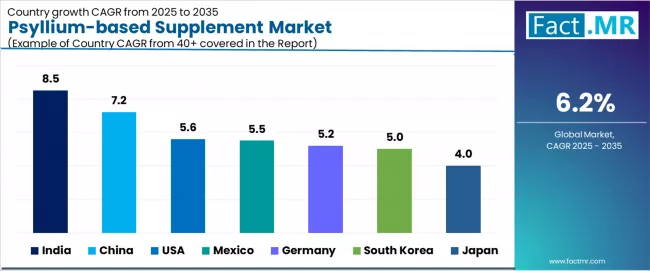
| Country | CAGR (2025-2035) |
|---|---|
| India | 8.5% |
| China | 7.2% |
| USA | 5.6% |
| Mexico | 5.5% |
| Germany | 5.2% |
| South Korea | 5.0% |
| Japan | 4.0% |
The psyllium-based supplement market is experiencing varied growth globally, with India leading at a 8.5% CAGR through 2035, driven by the expansion of health infrastructure development, increasing wellness capabilities, and growing domestic demand for high-efficiency psyllium-based supplement systems.
China follows at 7.2%, supported by health industry expansion, growing recognition of advanced fiber technology importance, and expanding wellness capacity. USA records 5.6% growth, with focus on developing nutraceutical and wellness industries.
Mexico shows 5.5% growth, representing emerging market development with growing health frameworks. Germany demonstrates 5.2% growth, emphasizing health infrastructure expansion and systematic wellness approaches.
South Korea maintains 5.0% growth, driven by advanced health technology adoption. Japan demonstrates 4.0% growth, emphasizing precision health management and wellness optimization.
India Demonstrates Growing Market Potential with Health Infrastructure Development
Revenue from psyllium-based supplements in India is projected to exhibit robust growth with a CAGR of 8.5% through 2035, driven by ongoing health industry expansion and increasing recognition of high-efficiency psyllium-based supplement systems as essential fiber components for complex wellness processes. The country's expanding health infrastructure and growing availability of specialized fiber capabilities are creating significant opportunities for psyllium-based supplement adoption across both domestic and export-oriented health facilities. Major international and domestic health companies are establishing comprehensive distribution and wellness networks to serve the growing population of health providers and wellness facilities requiring high-performance psyllium-based supplement systems across digestive health and wellness applications throughout India's major health hubs.
The Indian government's strategic emphasis on health modernization and wellness advancement is driving substantial investments in specialized fiber capabilities. This policy support, combined with the country's large domestic health market and expanding wellness requirements, creates a favorable environment for the psyllium-based supplement market development. Indian health providers are increasingly focusing on high-value fiber technologies to improve health capabilities, with psyllium-based supplements representing a key component in this health industry transformation.
- Government initiatives supporting health development and wellness modernization are driving demand for high-efficiency psyllium-based supplement systems throughout major health and wellness centers, including Mumbai, Delhi, and Bangalore regions.
- Wellness capacity expansion and fiber system development are supporting appropriate utilization of psyllium-based supplements among health providers and wellness facilities nationwide, with particular growth in digestive health operations and wellness services.
China Demonstrates Exceptional Market Potential with Health Industry Growth
Revenue from psyllium-based supplements in China is expanding at a CAGR of 7.2%, supported by increasing health accessibility, growing wellness awareness, and developing fiber technology market presence across the country's major health clusters. The country's large health sector and increasing recognition of advanced psyllium-based supplement systems are driving demand for effective high-efficiency fiber solutions in both health and wellness applications. International health companies and domestic providers are establishing comprehensive distribution channels to serve the growing demand for quality psyllium-based supplement systems while supporting the country's position as an emerging fiber technology market.
China's health sector continues to benefit from favorable wellness policies, expanding health capabilities, and cost-competitive health infrastructure development. The country's focus on becoming a global health technology hub is driving investments in specialized psyllium-based supplement technology and wellness infrastructure. This development is particularly important for psyllium-based supplement applications, as health providers seek reliable domestic sources for critical fiber products to reduce import dependency and improve supply chain security.
- Rising awareness about advanced fiber options and improving health capabilities are creating opportunities for specialized psyllium-based supplement systems across health and wellness settings in major hubs like Beijing, Shanghai, and Guangzhou.
- Growing health infrastructure development and technology adoption are supporting increased access to high-efficiency psyllium-based supplements among organizations requiring comprehensive fiber capabilities, particularly in health and wellness organizations.
USA Maintains Technology Leadership
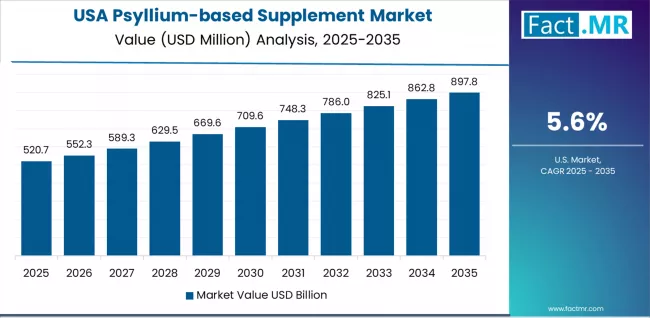
USA's advanced health technology market demonstrates sophisticated wellness deployment with documented psyllium-based supplement effectiveness in health departments and wellness centers through integration with existing health systems and wellness infrastructure. The country leverages health expertise in fiber technology and wellness systems integration to maintain a 5.6% CAGR through 2035. Health centers, including major metropolitan areas, showcase premium installations where psyllium-based supplement systems integrate with comprehensive health information systems and wellness platforms to optimize health accuracy and operational workflow effectiveness.
American health providers prioritize system reliability and regulatory compliance in wellness development, creating demand for premium systems with advanced features, including quality validation and integration with US health standards. The market benefits from established health industry infrastructure and a willingness to invest in advanced psyllium-based supplement technologies that provide long-term operational benefits and compliance with health regulations.
Mexico Shows Strong Regional Development
Mexico's psyllium-based supplement market demonstrates solid growth potential with a 5.5% CAGR through 2035, driven by expanding health capabilities, growing wellness industry development, and increasing recognition of premium fiber products in health operations. The country's strategic position as a regional health hub and growing domestic demand for high-quality fiber products are creating substantial opportunities for psyllium-based supplement adoption across both traditional and modern health facilities. International health companies and local wellness providers are establishing comprehensive fiber supply networks to serve Mexico's expanding health industry requirements.
The Mexican health sector benefits from favorable trade relationships, expanding wellness infrastructure, and growing consumer awareness of quality health products. Government initiatives supporting health industry modernization and wellness development are driving investments in advanced fiber technologies. Mexican health providers are increasingly adopting international quality standards and health technologies, with psyllium-based supplements representing an important component in achieving premium health specifications and meeting wellness market requirements.
- Health industry expansion programs and wellness development initiatives are creating demand for specialized psyllium-based supplement systems across major health regions, including Mexico City, Guadalajara, and Monterrey metropolitan areas.
- Growing nutraceutical and wellness sectors are driving increased utilization of psyllium-based supplement products among health providers seeking to improve wellness outcomes and health efficiency in both domestic and export-oriented operations.
Germany Shows Strong Regional Leadership
Germany's market expansion benefits from diverse health demand, including wellness modernization in Berlin and Munich, health development programs, and government wellness programs that increasingly incorporate psyllium-based supplement solutions for health enhancement applications. The country maintains a 5.2% CAGR through 2035, driven by rising health awareness and increasing adoption of fiber benefits, including superior wellness capabilities and reduced health complexity.
Market dynamics focus on cost-effective psyllium-based supplement solutions that balance advanced health features with affordability considerations important to German health operators. Growing health infrastructure creates demand for modern fiber systems in new wellness facilities and health equipment modernization projects.
Strategic Market Considerations:
- Health and wellness segments leading growth with focus on health enhancement and operational efficiency applications
- Regional health requirements are driving a diverse product portfolio from basic psyllium-based supplement systems to advanced wellness platforms
- Import dependency challenges offset by potential local development partnerships with international fiber manufacturers
- Government health initiatives beginning to influence procurement standards and wellness requirements
South Korea Demonstrates Premium Market Development
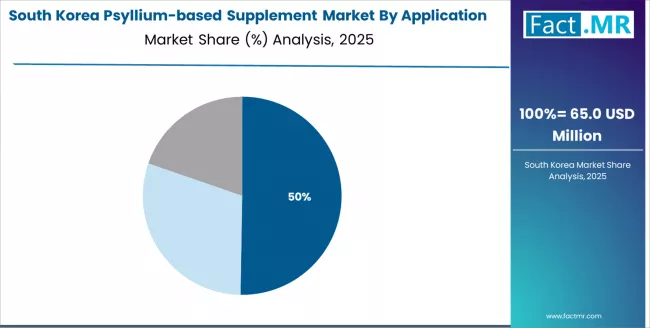
South Korea's psyllium-based supplement market exhibits steady growth with a 5.0% CAGR through 2035, characterized by advanced health capabilities, premium wellness adoption, and sophisticated health standards across the country's concentrated health industry clusters. The market benefits from high consumer quality expectations, advanced health technology infrastructure, and strong government support for health industry innovation. Korean health providers are increasingly incorporating international wellness standards and advanced health technologies to meet both domestic premium market demands and health requirements.
The country's focus on health safety, quality control, and technological advancement creates favorable conditions for premium psyllium-based supplement adoption across specialized health applications. South Korean health companies prioritize product traceability, quality consistency, and wellness efficiency, driving demand for high-specification psyllium-based supplement systems that meet stringent health requirements. The market also benefits from strong research and development capabilities and close integration with global health technology trends.
- Advanced health facilities in Seoul, Busan, and Incheon regions are driving demand for premium psyllium-based supplement systems that meet sophisticated quality control and wellness efficiency requirements.
- Growing e-commerce and pharmacy sectors, combined with expanding health product distribution, are supporting increased adoption of specialized psyllium-based supplement products among health providers focused on premium wellness development and health market penetration.
Japan Emphasizes Precision and Integration Excellence
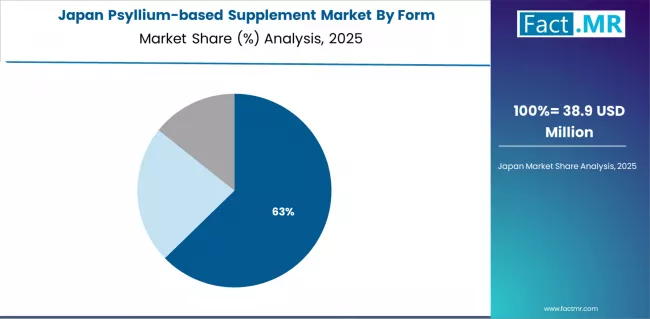
Japan demonstrates steady market development with a 4.0% CAGR through 2035, distinguished by health operators' preference for high-quality psyllium-based supplement systems that integrate seamlessly with existing health equipment and provide reliable long-term operation in specialized wellness applications. The market prioritizes advanced features, including precision health algorithms, quality validation, and integration with comprehensive health platforms that reflect Japanese health expectations for technological sophistication and operational excellence.
Japanese health providers focus on system reliability and precision in psyllium-based supplement development, creating demand for premium systems with advanced features including automated quality monitoring and comprehensive wellness support. The market benefits from established health research infrastructure and investment in fiber technology that provides long-term health benefits.
Strategic Market Indicators:
- Premium focus on precision systems with advanced health algorithms and high-reliability capabilities
- Integration requirements with existing health information systems and wellness management platforms
- Emphasis on psyllium-based supplement reliability and long-term performance in health applications
Europe Market Split by Country
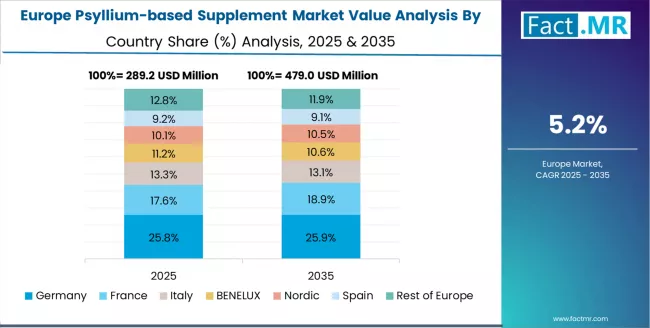
The psyllium-based supplement market in Europe is projected to grow from USD 1,200.0 million in 2025 to USD 2,200.0 million by 2035, registering a CAGR of 6.2% over the forecast period. Germany is expected to maintain its leadership position with a 24.2% market share in 2025, rising to 24.5% by 2035, supported by its advanced health infrastructure, precision wellness capabilities, and strong health industry presence throughout major wellness regions.
The United Kingdom follows with a 18.3% share in 2025, projected to reach 18.5% by 2035, driven by advanced health protocols, wellness innovation integration, and expanding specialty health networks serving both domestic and international markets. France holds a 15.0% share in 2025, expected to increase to 15.2% by 2035, supported by health infrastructure expansion and growing adoption of high-efficiency psyllium-based supplement systems. Italy commands a 11.7% share in 2025, projected to reach 11.8% by 2035, while Spain accounts for 9.2% in 2025, expected to reach 9.3% by 2035. The Rest of Europe region, including Nordic countries, Eastern Europe, and smaller Western European markets, is anticipated to hold 21.7% in 2025, declining slightly to 20.7% by 2035, attributed to market consolidation toward larger core markets with established health and wellness capabilities.
Competitive Landscape of the Psyllium-based Supplement Market
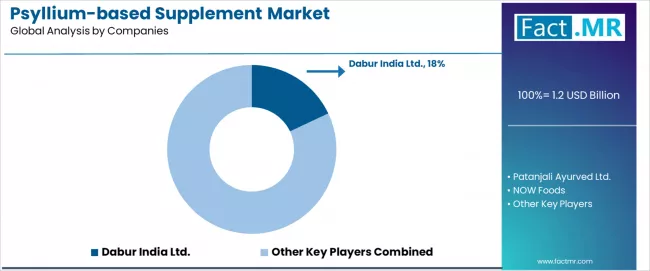
The psyllium-based supplement market is characterized by competition among established health product manufacturers, specialty nutraceutical companies, and wellness technology suppliers focused on delivering high-efficiency, consistent, and reliable psyllium-based supplement systems. Companies are investing in fiber technology advancement, quality control enhancement, strategic partnerships, and customer technical support to deliver effective, efficient, and reliable psyllium-based supplement solutions that meet stringent health and wellness requirements. Health optimization, quality validation protocols, and supply chain strategies are central to strengthening product portfolios and market presence.
Dabur leads the market with comprehensive high-efficiency psyllium-based supplement system offerings with a focus on quality consistency and health reliability for wellness applications. Patanjali provides specialized fiber systems with emphasis on health applications and comprehensive technical support services. NOW Foods focuses on advanced psyllium-based supplement technologies and customized health solutions for fiber systems serving global markets. Nature's Bounty delivers established health systems with strong quality control systems and customer service capabilities.
Metamucil operates with a focus on bringing innovative psyllium-based supplement technologies to specialized health applications and emerging markets. Yerba Prima provides comprehensive fiber system portfolios, including advanced psyllium-based supplements, across multiple health applications and wellness processes. Himalaya specializes in customized health solutions and quality management systems for wellness systems with emphasis on regulatory compliance. Organic India provides reliable supply chain solutions and technical expertise to enhance market accessibility and customer access to essential psyllium-based supplement systems.
Key Players in the Psyllium-based Supplement Market
- Dabur India Ltd.
- Patanjali Ayurved Ltd.
- NOW Foods
- Nature’s Bounty
- Metamucil (Procter & Gamble)
- Yerba Prima Inc.
- Himalaya Wellness Company
- Organic India Pvt. Ltd.
- Jarrow Formulas Inc.
- NutraBio Labs Inc.
- Herbalife Nutrition Ltd.
- Swanson Health Products
- Sunmark (McKesson Corp.)
- Vitacost (Kroger Co.)
- HealthKart (Bright Lifecare Pvt. Ltd.)
Scope of the Report
| Items | Values |
|---|---|
| Quantitative Units (2025) | USD 1,200.0 Million |
| Form | Powder, Capsules, Others |
| Application | Digestive Health, Weight Management, Cholesterol Support |
| Distribution Channel | E-commerce, Pharmacies, Retail |
| Regions Covered | Asia Pacific, North America, Europe, Latin America, Middle East & Africa |
| Countries Covered | China, USA, Germany, Japan, India, South Korea, Mexico and 40+ countries |
| Key Companies Profiled | Dabur, Patanjali, NOW Foods, Nature's Bounty, Metamucil, Yerba Prima, Himalaya, and Organic India |
| Additional Attributes | Dollar sales by form and application, regional demand trends, competitive landscape, health provider preferences for specific psyllium-based supplement systems, integration with specialty health supply chains, innovations in fiber technologies, quality monitoring, and wellness optimization |
Psyllium-based Supplement Market by Segments
-
Form:
- Powder
- Capsules
- Others
-
Application:
- Digestive Health
- Weight Management
- Cholesterol Support
-
Distribution Channel:
- E-commerce
- Pharmacies
- Retail
-
Region:
-
Asia Pacific
- China
- India
- Japan
- South Korea
- ASEAN
- Australia & New Zealand
- Rest of Asia Pacific
-
North America
- United States
- Canada
- Mexico
-
Europe
- Germany
- United Kingdom
- France
- Italy
- Spain
- Nordic
- BENELUX
- Rest of Europe
-
Latin America
- Brazil
- Argentina
- Chile
- Rest of Latin America
-
Middle East & Africa
- Kingdom of Saudi Arabia
- Other GCC Countries
- Turkey
- South Africa
- Other African Countries
- Rest of Middle East & Africa
-
Table of Content
- Executive Summary
- Global Market Outlook
- Demand to side Trends
- Supply to side Trends
- Technology Roadmap Analysis
- Analysis and Recommendations
- Market Overview
- Market Coverage / Taxonomy
- Market Definition / Scope / Limitations
- Market Background
- Market Dynamics
- Drivers
- Restraints
- Opportunity
- Trends
- Scenario Forecast
- Demand in Optimistic Scenario
- Demand in Likely Scenario
- Demand in Conservative Scenario
- Opportunity Map Analysis
- Product Life Cycle Analysis
- Supply Chain Analysis
- Investment Feasibility Matrix
- Value Chain Analysis
- PESTLE and Porter’s Analysis
- Regulatory Landscape
- Regional Parent Market Outlook
- Production and Consumption Statistics
- Import and Export Statistics
- Market Dynamics
- Global Market Analysis 2020 to 2024 and Forecast, 2025 to 2035
- Historical Market Size Value (USD Million) Analysis, 2020 to 2024
- Current and Future Market Size Value (USD Million) Projections, 2025 to 2035
- Y to o to Y Growth Trend Analysis
- Absolute $ Opportunity Analysis
- Global Market Pricing Analysis 2020 to 2024 and Forecast 2025 to 2035
- Global Market Analysis 2020 to 2024 and Forecast 2025 to 2035, By Form
- Introduction / Key Findings
- Historical Market Size Value (USD Million) Analysis By Form , 2020 to 2024
- Current and Future Market Size Value (USD Million) Analysis and Forecast By Form , 2025 to 2035
- Powder
- Capsules
- Others
- Y to o to Y Growth Trend Analysis By Form , 2020 to 2024
- Absolute $ Opportunity Analysis By Form , 2025 to 2035
- Global Market Analysis 2020 to 2024 and Forecast 2025 to 2035, By Application
- Introduction / Key Findings
- Historical Market Size Value (USD Million) Analysis By Application, 2020 to 2024
- Current and Future Market Size Value (USD Million) Analysis and Forecast By Application, 2025 to 2035
- Digestive Health
- Weight Management
- Cholesterol Support
- Y to o to Y Growth Trend Analysis By Application, 2020 to 2024
- Absolute $ Opportunity Analysis By Application, 2025 to 2035
- Global Market Analysis 2020 to 2024 and Forecast 2025 to 2035, By Region
- Introduction
- Historical Market Size Value (USD Million) Analysis By Region, 2020 to 2024
- Current Market Size Value (USD Million) Analysis and Forecast By Region, 2025 to 2035
- North America
- Latin America
- Western Europe
- Eastern Europe
- East Asia
- South Asia and Pacific
- Middle East & Africa
- Market Attractiveness Analysis By Region
- North America Market Analysis 2020 to 2024 and Forecast 2025 to 2035, By Country
- Historical Market Size Value (USD Million) Trend Analysis By Market Taxonomy, 2020 to 2024
- Market Size Value (USD Million) Forecast By Market Taxonomy, 2025 to 2035
- By Country
- USA
- Canada
- Mexico
- By Form
- By Application
- By Country
- Market Attractiveness Analysis
- By Country
- By Form
- By Application
- Key Takeaways
- Latin America Market Analysis 2020 to 2024 and Forecast 2025 to 2035, By Country
- Historical Market Size Value (USD Million) Trend Analysis By Market Taxonomy, 2020 to 2024
- Market Size Value (USD Million) Forecast By Market Taxonomy, 2025 to 2035
- By Country
- Brazil
- Chile
- Rest of Latin America
- By Form
- By Application
- By Country
- Market Attractiveness Analysis
- By Country
- By Form
- By Application
- Key Takeaways
- Western Europe Market Analysis 2020 to 2024 and Forecast 2025 to 2035, By Country
- Historical Market Size Value (USD Million) Trend Analysis By Market Taxonomy, 2020 to 2024
- Market Size Value (USD Million) Forecast By Market Taxonomy, 2025 to 2035
- By Country
- Germany
- UK
- Italy
- Spain
- France
- Nordic
- BENELUX
- Rest of Western Europe
- By Form
- By Application
- By Country
- Market Attractiveness Analysis
- By Country
- By Form
- By Application
- Key Takeaways
- Eastern Europe Market Analysis 2020 to 2024 and Forecast 2025 to 2035, By Country
- Historical Market Size Value (USD Million) Trend Analysis By Market Taxonomy, 2020 to 2024
- Market Size Value (USD Million) Forecast By Market Taxonomy, 2025 to 2035
- By Country
- Russia
- Poland
- Hungary
- Balkan & Baltic
- Rest of Eastern Europe
- By Form
- By Application
- By Country
- Market Attractiveness Analysis
- By Country
- By Form
- By Application
- Key Takeaways
- East Asia Market Analysis 2020 to 2024 and Forecast 2025 to 2035, By Country
- Historical Market Size Value (USD Million) Trend Analysis By Market Taxonomy, 2020 to 2024
- Market Size Value (USD Million) Forecast By Market Taxonomy, 2025 to 2035
- By Country
- China
- Japan
- South Korea
- By Form
- By Application
- By Country
- Market Attractiveness Analysis
- By Country
- By Form
- By Application
- Key Takeaways
- South Asia and Pacific Market Analysis 2020 to 2024 and Forecast 2025 to 2035, By Country
- Historical Market Size Value (USD Million) Trend Analysis By Market Taxonomy, 2020 to 2024
- Market Size Value (USD Million) Forecast By Market Taxonomy, 2025 to 2035
- By Country
- India
- ASEAN
- Australia & New Zealand
- Rest of South Asia and Pacific
- By Form
- By Application
- By Country
- Market Attractiveness Analysis
- By Country
- By Form
- By Application
- Key Takeaways
- Middle East & Africa Market Analysis 2020 to 2024 and Forecast 2025 to 2035, By Country
- Historical Market Size Value (USD Million) Trend Analysis By Market Taxonomy, 2020 to 2024
- Market Size Value (USD Million) Forecast By Market Taxonomy, 2025 to 2035
- By Country
- Kingdom of Saudi Arabia
- Other GCC Countries
- Turkiye
- South Africa
- Other African Union
- Rest of Middle East & Africa
- By Form
- By Application
- By Country
- Market Attractiveness Analysis
- By Country
- By Form
- By Application
- Key Takeaways
- Key Countries Market Analysis
- USA
- Pricing Analysis
- Market Share Analysis, 2024
- By Form
- By Application
- Canada
- Pricing Analysis
- Market Share Analysis, 2024
- By Form
- By Application
- Mexico
- Pricing Analysis
- Market Share Analysis, 2024
- By Form
- By Application
- Brazil
- Pricing Analysis
- Market Share Analysis, 2024
- By Form
- By Application
- Chile
- Pricing Analysis
- Market Share Analysis, 2024
- By Form
- By Application
- Germany
- Pricing Analysis
- Market Share Analysis, 2024
- By Form
- By Application
- UK
- Pricing Analysis
- Market Share Analysis, 2024
- By Form
- By Application
- Italy
- Pricing Analysis
- Market Share Analysis, 2024
- By Form
- By Application
- Spain
- Pricing Analysis
- Market Share Analysis, 2024
- By Form
- By Application
- France
- Pricing Analysis
- Market Share Analysis, 2024
- By Form
- By Application
- India
- Pricing Analysis
- Market Share Analysis, 2024
- By Form
- By Application
- ASEAN
- Pricing Analysis
- Market Share Analysis, 2024
- By Form
- By Application
- Australia & New Zealand
- Pricing Analysis
- Market Share Analysis, 2024
- By Form
- By Application
- China
- Pricing Analysis
- Market Share Analysis, 2024
- By Form
- By Application
- Japan
- Pricing Analysis
- Market Share Analysis, 2024
- By Form
- By Application
- South Korea
- Pricing Analysis
- Market Share Analysis, 2024
- By Form
- By Application
- Russia
- Pricing Analysis
- Market Share Analysis, 2024
- By Form
- By Application
- Poland
- Pricing Analysis
- Market Share Analysis, 2024
- By Form
- By Application
- Hungary
- Pricing Analysis
- Market Share Analysis, 2024
- By Form
- By Application
- Kingdom of Saudi Arabia
- Pricing Analysis
- Market Share Analysis, 2024
- By Form
- By Application
- Turkiye
- Pricing Analysis
- Market Share Analysis, 2024
- By Form
- By Application
- South Africa
- Pricing Analysis
- Market Share Analysis, 2024
- By Form
- By Application
- USA
- Market Structure Analysis
- Competition Dashboard
- Competition Benchmarking
- Market Share Analysis of Top Players
- By Regional
- By Form
- By Application
- Competition Analysis
- Competition Deep Dive
- Dabur India Ltd.
- Overview
- Product Portfolio
- Profitability by Market Segments (Product/Age /Sales Channel/Region)
- Sales Footprint
- Strategy Overview
- Marketing Strategy
- Product Strategy
- Channel Strategy
- Patanjali Ayurved Ltd.
- NOW Foods
- Nature’s Bounty
- Metamucil (Procter & Gamble)
- Yerba Prima Inc.
- Himalaya Wellness Company
- Organic India Pvt. Ltd.
- Jarrow Formulas Inc.
- NutraBio Labs Inc.
- Herbalife Nutrition Ltd.
- Swanson Health Products
- Sunmark (McKesson Corp.)
- Vitacost (Kroger Co.)
- HealthKart (Bright Lifecare Pvt. Ltd.)
- Dabur India Ltd.
- Competition Deep Dive
- Assumptions & Acronyms Used
- Research Methodology
List Of Table
- Table 1: Global Market Value (USD Million) Forecast by Region, 2020 to 2035
- Table 2: Global Market Value (USD Million) Forecast by Form , 2020 to 2035
- Table 3: Global Market Value (USD Million) Forecast by Application, 2020 to 2035
- Table 4: North America Market Value (USD Million) Forecast by Country, 2020 to 2035
- Table 5: North America Market Value (USD Million) Forecast by Form , 2020 to 2035
- Table 6: North America Market Value (USD Million) Forecast by Application, 2020 to 2035
- Table 7: Latin America Market Value (USD Million) Forecast by Country, 2020 to 2035
- Table 8: Latin America Market Value (USD Million) Forecast by Form , 2020 to 2035
- Table 9: Latin America Market Value (USD Million) Forecast by Application, 2020 to 2035
- Table 10: Western Europe Market Value (USD Million) Forecast by Country, 2020 to 2035
- Table 11: Western Europe Market Value (USD Million) Forecast by Form , 2020 to 2035
- Table 12: Western Europe Market Value (USD Million) Forecast by Application, 2020 to 2035
- Table 13: Eastern Europe Market Value (USD Million) Forecast by Country, 2020 to 2035
- Table 14: Eastern Europe Market Value (USD Million) Forecast by Form , 2020 to 2035
- Table 15: Eastern Europe Market Value (USD Million) Forecast by Application, 2020 to 2035
- Table 16: East Asia Market Value (USD Million) Forecast by Country, 2020 to 2035
- Table 17: East Asia Market Value (USD Million) Forecast by Form , 2020 to 2035
- Table 18: East Asia Market Value (USD Million) Forecast by Application, 2020 to 2035
- Table 19: South Asia and Pacific Market Value (USD Million) Forecast by Country, 2020 to 2035
- Table 20: South Asia and Pacific Market Value (USD Million) Forecast by Form , 2020 to 2035
- Table 21: South Asia and Pacific Market Value (USD Million) Forecast by Application, 2020 to 2035
- Table 22: Middle East & Africa Market Value (USD Million) Forecast by Country, 2020 to 2035
- Table 23: Middle East & Africa Market Value (USD Million) Forecast by Form , 2020 to 2035
- Table 24: Middle East & Africa Market Value (USD Million) Forecast by Application, 2020 to 2035
List Of Figures
- Figure 1: Global Market Pricing Analysis
- Figure 2: Global Market Value (USD Million) Forecast 2020-2035
- Figure 3: Global Market Value Share and BPS Analysis by Form , 2025 and 2035
- Figure 4: Global Market Y to o to Y Growth Comparison by Form , 2025-2035
- Figure 5: Global Market Attractiveness Analysis by Form
- Figure 6: Global Market Value Share and BPS Analysis by Application, 2025 and 2035
- Figure 7: Global Market Y to o to Y Growth Comparison by Application, 2025-2035
- Figure 8: Global Market Attractiveness Analysis by Application
- Figure 9: Global Market Value (USD Million) Share and BPS Analysis by Region, 2025 and 2035
- Figure 10: Global Market Y to o to Y Growth Comparison by Region, 2025-2035
- Figure 11: Global Market Attractiveness Analysis by Region
- Figure 12: North America Market Incremental Dollar Opportunity, 2025-2035
- Figure 13: Latin America Market Incremental Dollar Opportunity, 2025-2035
- Figure 14: Western Europe Market Incremental Dollar Opportunity, 2025-2035
- Figure 15: Eastern Europe Market Incremental Dollar Opportunity, 2025-2035
- Figure 16: East Asia Market Incremental Dollar Opportunity, 2025-2035
- Figure 17: South Asia and Pacific Market Incremental Dollar Opportunity, 2025-2035
- Figure 18: Middle East & Africa Market Incremental Dollar Opportunity, 2025-2035
- Figure 19: North America Market Value Share and BPS Analysis by Country, 2025 and 2035
- Figure 20: North America Market Value Share and BPS Analysis by Form , 2025 and 2035
- Figure 21: North America Market Y to o to Y Growth Comparison by Form , 2025-2035
- Figure 22: North America Market Attractiveness Analysis by Form
- Figure 23: North America Market Value Share and BPS Analysis by Application, 2025 and 2035
- Figure 24: North America Market Y to o to Y Growth Comparison by Application, 2025-2035
- Figure 25: North America Market Attractiveness Analysis by Application
- Figure 26: Latin America Market Value Share and BPS Analysis by Country, 2025 and 2035
- Figure 27: Latin America Market Value Share and BPS Analysis by Form , 2025 and 2035
- Figure 28: Latin America Market Y to o to Y Growth Comparison by Form , 2025-2035
- Figure 29: Latin America Market Attractiveness Analysis by Form
- Figure 30: Latin America Market Value Share and BPS Analysis by Application, 2025 and 2035
- Figure 31: Latin America Market Y to o to Y Growth Comparison by Application, 2025-2035
- Figure 32: Latin America Market Attractiveness Analysis by Application
- Figure 33: Western Europe Market Value Share and BPS Analysis by Country, 2025 and 2035
- Figure 34: Western Europe Market Value Share and BPS Analysis by Form , 2025 and 2035
- Figure 35: Western Europe Market Y to o to Y Growth Comparison by Form , 2025-2035
- Figure 36: Western Europe Market Attractiveness Analysis by Form
- Figure 37: Western Europe Market Value Share and BPS Analysis by Application, 2025 and 2035
- Figure 38: Western Europe Market Y to o to Y Growth Comparison by Application, 2025-2035
- Figure 39: Western Europe Market Attractiveness Analysis by Application
- Figure 40: Eastern Europe Market Value Share and BPS Analysis by Country, 2025 and 2035
- Figure 41: Eastern Europe Market Value Share and BPS Analysis by Form , 2025 and 2035
- Figure 42: Eastern Europe Market Y to o to Y Growth Comparison by Form , 2025-2035
- Figure 43: Eastern Europe Market Attractiveness Analysis by Form
- Figure 44: Eastern Europe Market Value Share and BPS Analysis by Application, 2025 and 2035
- Figure 45: Eastern Europe Market Y to o to Y Growth Comparison by Application, 2025-2035
- Figure 46: Eastern Europe Market Attractiveness Analysis by Application
- Figure 47: East Asia Market Value Share and BPS Analysis by Country, 2025 and 2035
- Figure 48: East Asia Market Value Share and BPS Analysis by Form , 2025 and 2035
- Figure 49: East Asia Market Y to o to Y Growth Comparison by Form , 2025-2035
- Figure 50: East Asia Market Attractiveness Analysis by Form
- Figure 51: East Asia Market Value Share and BPS Analysis by Application, 2025 and 2035
- Figure 52: East Asia Market Y to o to Y Growth Comparison by Application, 2025-2035
- Figure 53: East Asia Market Attractiveness Analysis by Application
- Figure 54: South Asia and Pacific Market Value Share and BPS Analysis by Country, 2025 and 2035
- Figure 55: South Asia and Pacific Market Value Share and BPS Analysis by Form , 2025 and 2035
- Figure 56: South Asia and Pacific Market Y to o to Y Growth Comparison by Form , 2025-2035
- Figure 57: South Asia and Pacific Market Attractiveness Analysis by Form
- Figure 58: South Asia and Pacific Market Value Share and BPS Analysis by Application, 2025 and 2035
- Figure 59: South Asia and Pacific Market Y to o to Y Growth Comparison by Application, 2025-2035
- Figure 60: South Asia and Pacific Market Attractiveness Analysis by Application
- Figure 61: Middle East & Africa Market Value Share and BPS Analysis by Country, 2025 and 2035
- Figure 62: Middle East & Africa Market Value Share and BPS Analysis by Form , 2025 and 2035
- Figure 63: Middle East & Africa Market Y to o to Y Growth Comparison by Form , 2025-2035
- Figure 64: Middle East & Africa Market Attractiveness Analysis by Form
- Figure 65: Middle East & Africa Market Value Share and BPS Analysis by Application, 2025 and 2035
- Figure 66: Middle East & Africa Market Y to o to Y Growth Comparison by Application, 2025-2035
- Figure 67: Middle East & Africa Market Attractiveness Analysis by Application
- Figure 68: Global Market - Tier Structure Analysis
- Figure 69: Global Market - Company Share Analysis
- FAQs -
How big is the psyllium-based supplement market in 2025?
The global psyllium-based supplement market is estimated to be valued at USD 1.2 billion in 2025.
What will be the size of psyllium-based supplement market in 2035?
The market size for the psyllium-based supplement market is projected to reach USD 2.2 billion by 2035.
How much will be the psyllium-based supplement market growth between 2025 and 2035?
The psyllium-based supplement market is expected to grow at a 6.2% CAGR between 2025 and 2035.
What are the key product types in the psyllium-based supplement market?
The key product types in psyllium-based supplement market are powder, capsules and others.
Which application segment to contribute significant share in the psyllium-based supplement market in 2025?
In terms of application , digestive health segment to command 50.0% share in the psyllium-based supplement market in 2025.